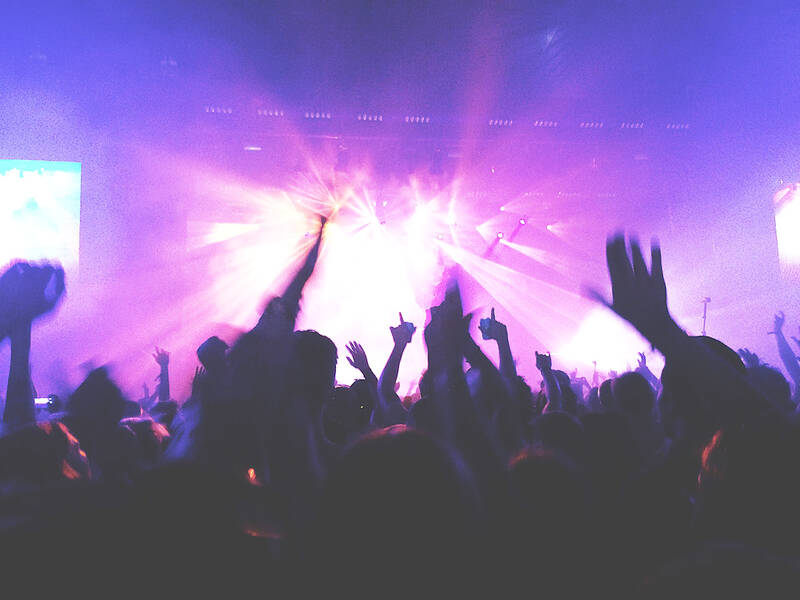對話 Dialogue
清清:我弟剛剛傳訊息跟我說,他這個週末要去台北大佳河濱公園,參加S2O Taiwan潑水音樂節,他跟朋友早就把票買好了,可是沒告訴我,真可惡!
Qīngqing: Wǒ dì gānggāng chuán xùnxí gēn wǒ shuō, tā zhège zhōumò yào qù Táiběi Dàjiā Hébīn Gōngyuán, cānjiā S20 Taiwan Pōshuǐ Yīnyuèjié, tā gēn péngyǒu zǎojiù bǎ piào mǎi hǎole, kěshì méi gàosù wǒ, zhēn kěwù!

PHOTO COURTESY OF Pxhere / 照片:Pxhere 提供
華華:他搶到票囉?那個活動超受年輕人的歡迎,能買到票算他厲害!
Huáhua: Tā qiǎngdào piào lou? Nèìge huódòng chāo shòu niánqīng rén de huānyíng, néng mǎidào piào suàn tā lìhài!
清清:我也還是年輕人啊!這個結合泰國潑水節的表演,是重量級的音樂派對,很值得去朝聖。
Qīngqing: Wǒ yě háishì niánqīng rén a! Zhèìge jiéhé Tàiguó Pōshuǐjié de biǎoyǎn, shì zhòngliàng jí de yīnyuè pàiduì, hěn zhídé qù cháoshèng.
華華:你弟確實不夠意思,竟然都沒找你一起去。不過,你自己沒注意到活動訊息,也不能完全怪他。
Huáhua: Nǐ dì quèshí búgòu yìsi, jìngrán dōu méi zhǎo nǐ yìqǐ qù. Búguò, nǐ zìjǐ méi zhùyì dào huódòng xùnxí, yě bù néng wánquán guài tā.
清清:也是啦!今年有不少國際大咖來演唱,歐美的、韓國的,也有臺灣藝人,現場一定會嗨到爆!
Qīngqing: Yěshì la! Jīnnián yǒu bùshǎo guójì dàkā lái yǎnchàng, Ōuměi de, Hánguó de, yěyǒu Táiwān yìrén, xiànchǎng yídìng huì hāi dào bào!
華華:你就等你弟玩回來跟你炫耀吧!別忌妒他喔!誰叫你沒跟上人家?
Huáhua: Nǐ jiù děng nǐ dì wán huílái gēn nǐ xuànyào ba! Bié jìdù tā o! Shéi jiào nǐ méi gēnshàng rénjiā?
清清:我才不跟他一般見識呢!反正我也不想去弄得濕濕的,祝他不會因此而感冒!哼!
Qīngqing: Wǒ cái bù gēn tā yìbānjiànshì ne! Fǎnzhèng wǒ yě bùxiǎng qù nòng de shīshī de, zhù tā búhuì yīncǐ ér gǎnmào! Heng!
華華:真受不了你欸!嘴這麼硬!好啦!快消消氣,我們去吃飯吧!
Huáhua: Zhēn shòubùliǎo nǐ ei! Zuǐ zhème yìng! Hǎo la! Kuài xiāoxiāoqì, wǒmen qù chīfàn ba!
翻譯 Translation
Qingqing: My brother just messaged me saying he’s going to Dajia Riverside Park in Taipei this weekend to attend the S2O Taiwan Songkran Music Festival. He and his friends bought their tickets a while ago but didn’t tell me. How despicable of him!
Huahua: He managed to get tickets? That event is super popular among young people. It’s impressive he got them.
Qingqing: I’m still young too! This event, which combines Thailand’s Songkran festival with a major music party, is definitely worth attending.
Huahua: Your brother wasn’t very considerate not inviting you. But you can’t entirely blame him if you didn’t keep an eye on the event yourself.
Qingqing: True. There are a lot of international stars performing this year, from the US, Europe, South Korea, and even Taiwan. The atmosphere will be incredible.
Huahua: Just wait until your brother comes back and brags about it. Don’t be too jealous. It’s your fault for not paying attention.
Qingqing: I won’t stoop to his level. Besides, I don’t want to get all wet. I just hope he doesn’t catch a cold. Hmph.
Huahua: You’re unbelievable! So stubborn. Alright, calm down. Let’s go get something to eat.
生詞 Vocabulary
1. 潑水節 (Pōshuǐ Jié) Water Festival
2. 重量級 (zhòngliàng jí) heavyweight
3. 朝聖 (cháoshèng) pilgrimage
4. 夠意思 (gòu yìsi) nice enough, considerate enough
5. 大咖 (dàkā) [slang] big shot, bigwig
6. 炫耀 (xuànyào) show off
7. 不跟A一般見識 (bù gēn A yìbānjiànshì) [phrase] not stooping to A’s level, not engaging in A’s level of discourse
8. 嘴硬 (zuǐyìng) stubborn in words, tough-talking
教材音檔 Audio Files
國立清華大學華語中心提供
By National Tsing Hua University Chinese Language Center:

In an effort to fight phone scams, British mobile phone company O2 has introduced Daisy, an AI designed to engage phone con artists in time-wasting conversations. Daisy is portrayed as a kindly British granny, exploiting scammers’ tendency to target the elderly. Her voice, based on a real grandmother’s for authenticity, adds to her credibility in the role. “O2” has distributed several dedicated phone numbers online to direct scammers to Daisy instead of actual customers. When Daisy receives a call, she translates the scammers’ spoken words into text and then responds to them accordingly through a text-to-speech system. Remarkably, Daisy

Bilingual Story is a fictionalized account. 雙語故事部分內容純屬虛構。 Emma had reviewed 41 resumes that morning. While the ATS screened out 288 unqualified, she screened for AI slop. She could spot it a mile away. She muttered AI buzzwords like curses under her breath. “Team player.” “Results-driven.” “Stakeholder alignment.” “Leveraging core competencies.” Each resume reeked of AI modeling: a cemetery of cliches, tombstones of personality. AI wasn’t just changing hiring. It was draining the humanity from it. Then she found it: a plain PDF cover letter. No template. No design flourishes. The first line read: “I once tried to automate my

Every May 1, Hawaii comes alive with Lei Day, a festival celebrating the rich culture and spirit of the islands. Initiated in 1927 by the poet Don Blanding, Lei Day began as a tribute to the Hawaiian custom of making and wearing leis. The idea was quickly adopted and officially recognized as a holiday in 1929, and leis have since become a symbol of local pride and cultural preservation. In Hawaiian culture, leis are more than decorative garlands made from flowers, shells or feathers. For Hawaiians, giving a lei is as natural as saying “aloha.” It shows love and

1. 他走出門,左右看一下,就過了馬路。 ˇ He walked outside, looked left and right, and crossed the road. χ He walked outside and looked left and right, crossed the road. 註︰並列連接詞 and 在這句中連接三個述語。一般的結構是 x, y, and z。x and y and z 是加強語氣的結構,x and y, z 則不可以。 2. 他們知道自己的弱點以及如何趕上其他競爭者。 ˇ They saw where their weak points lay and how they could catch up with the other competitors. χ They saw where their weak points lay and how to catch up with the other competitors. 註:and 一般連接同等成分,結構相等的單詞、片語或子句。誤句中 and 的前面是子句,後面是不定詞片語,不能用 and 連接,必須把不定詞片語改為子句,and 前後的結構才相等。 3. 她坐上計程車,直接到機場。 ˇ She took a cab, which took her straight to the airport. ˇ She took a cab and it took her straight